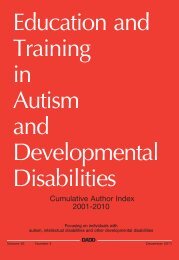Download the Journal (PDF) - Division on Autism and ...
Download the Journal (PDF) - Division on Autism and ...
Download the Journal (PDF) - Division on Autism and ...
You also want an ePaper? Increase the reach of your titles
YUMPU automatically turns print PDFs into web optimized ePapers that Google loves.
cal. She also took a l<strong>on</strong>g term subbing positi<strong>on</strong><br />
at a nearby high school in a categorical<br />
program before she started teaching at Harborville.<br />
Paula, who returned to get her bachelor’s<br />
degree in educati<strong>on</strong> following 25 years<br />
in <str<strong>on</strong>g>the</str<strong>on</strong>g> business world, planned <strong>on</strong> working in<br />
an elementary resource room program <strong>and</strong><br />
her pre-service teacher preparati<strong>on</strong> reflected<br />
this goal. Yet, she ended up working in a high<br />
school resource room for her first job. Although<br />
Paula referred to her high schoolers<br />
as, “not scary . . . same needs, just taller,” she<br />
seemed to sometimes struggle with <str<strong>on</strong>g>the</str<strong>on</strong>g> fact<br />
that her students were in high school with<br />
adolescent issues, needs, <strong>and</strong> desires (Interview,<br />
March 15, 2005). Paula’s elementary<br />
background filtered into <str<strong>on</strong>g>the</str<strong>on</strong>g> classroom. She<br />
had a tendency to enact more traditi<strong>on</strong>al “elementary<br />
activities” <strong>and</strong> treat her students in a<br />
younger fashi<strong>on</strong>. For example, <strong>on</strong> Valentine’s<br />
Day she brought in a Valentine’s Day cake,<br />
Valentine’s Day pencils, <strong>and</strong> had her students<br />
engage in Valentine’s Day activities, including<br />
estimating <str<strong>on</strong>g>the</str<strong>on</strong>g> number of c<strong>and</strong>y hearts in a jar<br />
<strong>and</strong> a Valentine’s Day word search. Paula indicated<br />
that she had not used <str<strong>on</strong>g>the</str<strong>on</strong>g>se activities<br />
since her elementary field placement. Her students<br />
acknowledged her predispositi<strong>on</strong> towards<br />
elementary as well, remarking to her<br />
<strong>and</strong> <str<strong>on</strong>g>the</str<strong>on</strong>g> researcher <strong>on</strong> numerous occasi<strong>on</strong>s<br />
“we aren’t in kindergarten” or o<str<strong>on</strong>g>the</str<strong>on</strong>g>r similar<br />
statements.<br />
Teachers’ beliefs <strong>and</strong> philosophies, both explicit<br />
<strong>and</strong> implicit, were influential. Katie articulated<br />
her philosophy as giving “students an<br />
opportunity to find something <str<strong>on</strong>g>the</str<strong>on</strong>g>y can relate<br />
to <strong>and</strong> to teach <str<strong>on</strong>g>the</str<strong>on</strong>g>m <str<strong>on</strong>g>the</str<strong>on</strong>g> basics of respect.<br />
Having respect for o<str<strong>on</strong>g>the</str<strong>on</strong>g>rs is probably <strong>on</strong>e of<br />
<str<strong>on</strong>g>the</str<strong>on</strong>g> most important things for me” (Interview,<br />
June 14, 2005). However, Katie’s implicit philosophy<br />
involved a str<strong>on</strong>g devoti<strong>on</strong> to preparing<br />
students to be employable <strong>and</strong> to have<br />
success post-school in terms of employment<br />
<strong>and</strong> independent living. For example, Katie<br />
indicated that cooking was <strong>on</strong>e of <str<strong>on</strong>g>the</str<strong>on</strong>g> most<br />
important curricular comp<strong>on</strong>ents for students,<br />
al<strong>on</strong>g with budgeting <strong>and</strong> basic reading<br />
for job applicati<strong>on</strong>s, descripti<strong>on</strong>s, <strong>and</strong> directi<strong>on</strong>s.<br />
Katie expected most of her students to seek<br />
employment after <str<strong>on</strong>g>the</str<strong>on</strong>g>y graduated <strong>and</strong> that became<br />
a focus of <str<strong>on</strong>g>the</str<strong>on</strong>g> program. She discussed<br />
getting students out into <str<strong>on</strong>g>the</str<strong>on</strong>g> community, al-<br />
302 / Educati<strong>on</strong> <strong>and</strong> Training in Developmental Disabilities-September 2008<br />
lowing <str<strong>on</strong>g>the</str<strong>on</strong>g>m to see job opportunities, <strong>and</strong><br />
helping <str<strong>on</strong>g>the</str<strong>on</strong>g>m figure out what <str<strong>on</strong>g>the</str<strong>on</strong>g>y might like<br />
to do. She expected that <str<strong>on</strong>g>the</str<strong>on</strong>g> vast majority of<br />
her students could hold down jobs, stating<br />
“. . . maybe a little different, but all can work at<br />
something.” Katie believed her students could<br />
be successful in life, yet she knew her students<br />
would always carry a label with <str<strong>on</strong>g>the</str<strong>on</strong>g>m, commenting<br />
“stereotypes will always be <str<strong>on</strong>g>the</str<strong>on</strong>g>re.<br />
These kids will always be that special educati<strong>on</strong><br />
kid” (Interview, June 14, 2005).<br />
Paula stated that her philosophy was simple,<br />
“to help students reach <str<strong>on</strong>g>the</str<strong>on</strong>g>ir goals <strong>and</strong> make<br />
decisi<strong>on</strong>s” (Interview, March 15, 2005). Yet,<br />
she exhibited low expectati<strong>on</strong>s of some of her<br />
students. Paula stated that her students were,<br />
“really low functi<strong>on</strong>ing” <strong>and</strong> implied that<br />
some would not live independently. Similarly,<br />
she indicated that she felt all her students<br />
would qualify for <strong>on</strong>e of two after-high school<br />
programs organized for <str<strong>on</strong>g>the</str<strong>on</strong>g> local districts<br />
through <str<strong>on</strong>g>the</str<strong>on</strong>g> county intermediate school system.<br />
These programs were designed for students<br />
with moderate <strong>and</strong> severe disabilities<br />
who were in need of additi<strong>on</strong>al life skills for a<br />
greater chance of success post-school. Paula<br />
also expressed doubts about her students’ performance<br />
<strong>on</strong> <str<strong>on</strong>g>the</str<strong>on</strong>g> alternate assessment designed<br />
for students with mild mental impairment,<br />
fearing it would be too difficult for her<br />
students; yet <str<strong>on</strong>g>the</str<strong>on</strong>g> majority of <str<strong>on</strong>g>the</str<strong>on</strong>g>m were students<br />
with learning disabilities or mild mental<br />
impairment.<br />
Paraprofessi<strong>on</strong>al factors. Although not originally<br />
hypo<str<strong>on</strong>g>the</str<strong>on</strong>g>sized as being a factor, paraprofessi<strong>on</strong>als<br />
were found to influence <str<strong>on</strong>g>the</str<strong>on</strong>g> enactment<br />
of a functi<strong>on</strong>al curriculum. At times <str<strong>on</strong>g>the</str<strong>on</strong>g><br />
paraprofessi<strong>on</strong>als acted as teachers <strong>and</strong> created<br />
activities, <strong>and</strong> at o<str<strong>on</strong>g>the</str<strong>on</strong>g>r times <str<strong>on</strong>g>the</str<strong>on</strong>g>ir roles<br />
were more of an “aide,” where <str<strong>on</strong>g>the</str<strong>on</strong>g>y performed<br />
duties such as making photocopies. The c<strong>on</strong>fusi<strong>on</strong><br />
over <str<strong>on</strong>g>the</str<strong>on</strong>g> role was evident in <str<strong>on</strong>g>the</str<strong>on</strong>g> discourse.<br />
One day Paula told <strong>on</strong>e of her paraprofessi<strong>on</strong>als,<br />
“You are a teacher. You are<br />
ano<str<strong>on</strong>g>the</str<strong>on</strong>g>r teacher . . . you are <strong>on</strong>e of us” (Fieldnotes,<br />
February 15, 2005). Yet <str<strong>on</strong>g>the</str<strong>on</strong>g> paraprofessi<strong>on</strong>als<br />
did not always see it that way. One<br />
commented that she lacked power in <str<strong>on</strong>g>the</str<strong>on</strong>g> classroom,<br />
stating, “I am just a parapro” (Fieldnotes,<br />
February 25, 2005). She indicated that<br />
she lacked power because she was not making<br />
decisi<strong>on</strong>s <strong>and</strong> she did not agree with decisi<strong>on</strong>s<br />
made.
















